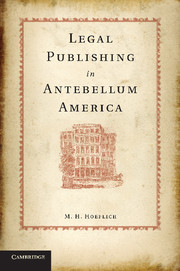Book contents
- Frontmatter
- Contents
- Preface
- Bibliographical Note
- Introduction
- 1 A Bookish Profession
- 2 Birth of the Law Book Trade
- 3 Spreading the Word: Catalogues and Cultivation
- 4 Bidding for Law Books
- 5 Risk, Subscriptions, and Status
- 6 John Livingston, Esq.: Law Bookseller as Cultural Entrepreneur
- 7 Conclusion: Selling the Law in Antebellum America
- Index
- References
7 - Conclusion: Selling the Law in Antebellum America
Published online by Cambridge University Press: 04 August 2010
- Frontmatter
- Contents
- Preface
- Bibliographical Note
- Introduction
- 1 A Bookish Profession
- 2 Birth of the Law Book Trade
- 3 Spreading the Word: Catalogues and Cultivation
- 4 Bidding for Law Books
- 5 Risk, Subscriptions, and Status
- 6 John Livingston, Esq.: Law Bookseller as Cultural Entrepreneur
- 7 Conclusion: Selling the Law in Antebellum America
- Index
- References
Summary
In one sense, this book has been about the growth of what may be called a “support industry.” Lawyers were, and are, bookish creatures by both inclination and professional necessity. At the very beginnings of our republic, there were few lawyers and relatively few law books being published in the United States. For the most part, American lawyers depended on imported English texts, which had to be transported across the ocean, a time-consuming and expensive process. But when they reached the United States, for most of these books, the travels were far from over. In the beginning, there were few specialized law booksellers and these, for the most part, were located in larger urban centers. General booksellers might well stock a few law books and, on occasion, even receive a shipment consisting primarily of legal texts, but the fact is most American lawyers before 1800 had relatively small law libraries, consisting mainly of local laws and case reports and the occasional English legal treatise.
By the outbreak of the Civil War, this situation had changed dramatically. In 1860, there were more than a dozen major law book houses, companies that published law books, sold their own and others' legal publications, often did binding and specialized legal printing, and had built a national network of customers whom they serviced through large and learned catalogues.
- Type
- Chapter
- Information
- Legal Publishing in Antebellum America , pp. 170 - 184Publisher: Cambridge University PressPrint publication year: 2010



